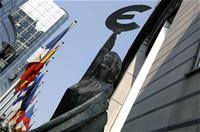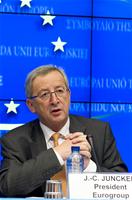The idea of eurobonds inflamed passions in the euro area
Ralitsa Kovacheva, December 8, 2010
 The idea of launching eurobonds has sparked fierce debates in Europe. Jean-Claude Juncker, Luxembourg’s prime minister and Eurogroup chairman, and Giulio Tremonti, Italy’s finance minister proposed a European Debt Agency to be established with a mandate to issue “E-bonds” equivalent to 40% of European Union’s GDP, the Financial Times wrote. The newspaper cited both men saying that such a measure would send a clear message to financial markets and European citizens about the “the irreversibility of the euro”. According to them, the idea will impose market discipline on governments, without them being exposed to “speculative attacks”, while at the same time fostering Europe’s financial and economic integration.
The idea of launching eurobonds has sparked fierce debates in Europe. Jean-Claude Juncker, Luxembourg’s prime minister and Eurogroup chairman, and Giulio Tremonti, Italy’s finance minister proposed a European Debt Agency to be established with a mandate to issue “E-bonds” equivalent to 40% of European Union’s GDP, the Financial Times wrote. The newspaper cited both men saying that such a measure would send a clear message to financial markets and European citizens about the “the irreversibility of the euro”. According to them, the idea will impose market discipline on governments, without them being exposed to “speculative attacks”, while at the same time fostering Europe’s financial and economic integration.
The idea was strongly supported by the leader of ALDE Group in the European  Parliament Guy Verhofstadt*. He is known as a rigorous critic of the Council because, by his view, it is used by the Member States to push their national interests rather than uphold the community one. In his article “How can we save the euro?” Guy Verhofstadt argues that eurobonds are the only real expression of solidarity among euro area countries. According to him, “the creation of a single bond market in euros could put an end to the increase of yield spreads” and all will benefit from lower interest rates.
Parliament Guy Verhofstadt*. He is known as a rigorous critic of the Council because, by his view, it is used by the Member States to push their national interests rather than uphold the community one. In his article “How can we save the euro?” Guy Verhofstadt argues that eurobonds are the only real expression of solidarity among euro area countries. According to him, “the creation of a single bond market in euros could put an end to the increase of yield spreads” and all will benefit from lower interest rates.
In order to encourage states to keep their debt within the 60% of GDP limit, required by the Stability and Growth Pact, Mr Verhofstadt proposed debt over this limit to be marketed separately, outside the single bond market and without being guaranteed by the euro area. “It goes without saying that these bonds would be more expensive”. As regards sanctions, Verhofstadt believes that “it is not the removal of voting rights [as proposed by Germany] but the progressive expulsion of the so-called “sinners” from the single bond market that will increase the pressure“.
 The idea, however, met strong resistance from Germany. Chancellor Angela Merkel said she was against the establishment of eurobonds for both legal and economic reasons. The German Finance Minister Wolfgang Schäuble, cited by the “Financial Times”, has also ruled out the use of jointly guaranteed eurobonds to finance borrowing by eurozone members as a move that would require “fundamental changes in the European treaty”. Mr Schäuble, however, is optimistic that in the long term the euro area countries, including Germany, would be prepared to give up more of their national budget authorities, the newspaper wrote.
The idea, however, met strong resistance from Germany. Chancellor Angela Merkel said she was against the establishment of eurobonds for both legal and economic reasons. The German Finance Minister Wolfgang Schäuble, cited by the “Financial Times”, has also ruled out the use of jointly guaranteed eurobonds to finance borrowing by eurozone members as a move that would require “fundamental changes in the European treaty”. Mr Schäuble, however, is optimistic that in the long term the euro area countries, including Germany, would be prepared to give up more of their national budget authorities, the newspaper wrote.
 Journalist's questions after the Eurogroup meeting on December 6 were aimed mainly at this topic. But the Eurogroup Chairman, Jean-Claude Juncker, said that the issue of eurobonds was not on the agenda and he would not comment on it any further. His behaviour, however, eloquently showed that the topic was probably discussed and maybe the discussion was quite difficult, because he was untypically concise, sharp and even sarcastic.
Journalist's questions after the Eurogroup meeting on December 6 were aimed mainly at this topic. But the Eurogroup Chairman, Jean-Claude Juncker, said that the issue of eurobonds was not on the agenda and he would not comment on it any further. His behaviour, however, eloquently showed that the topic was probably discussed and maybe the discussion was quite difficult, because he was untypically concise, sharp and even sarcastic.
“This is not as stupid as it sounds”, Juncker said regarding the proposal on the eurobonds. He recalled that he had proposed the European semester several times over the years and no one has expected it to happen. “The same faith is reserved to the eurobonds”, Juncker concluded. He firmly refused to answer any questions on the topic and cut off with monosyllabic answers all attempts by journalists to get more information.
 EU Economic and Monetary Affairs Commissioner Olli Rehn, in turn, demonstrated solidarity with his colleague, defining the idea of the eurobonds as “intellectually attractive” and recalled: “On 9th of May, in the context of the discussions on a financial backstop for the euro area, the Commission made a proposal for a community instrument backed by the common guarantees of the euro area Member States. As you may recall, this was rejected by the Council largely because for some it was having too much resemblance to the eurobonds.”
EU Economic and Monetary Affairs Commissioner Olli Rehn, in turn, demonstrated solidarity with his colleague, defining the idea of the eurobonds as “intellectually attractive” and recalled: “On 9th of May, in the context of the discussions on a financial backstop for the euro area, the Commission made a proposal for a community instrument backed by the common guarantees of the euro area Member States. As you may recall, this was rejected by the Council largely because for some it was having too much resemblance to the eurobonds.”
Analysts indicate that Germany's resistance against the eurobonds is due to fears that the country will have to pay higher interest rates on its loans because of fears of a Greek default, for example. Guy Verhofstadt challenged this view by arguing that “E-bonds will not debase competition between interest rates because the proposals suggest placing only a percentage of government debt of all eurozone countries on the single bond market.” Moreover, he said, “a special guarantee could be foreseen so that Germany will not pay a higher interest rate than at present”.
There is also the question how the proposal to issue common debt with common eurozone guarantees is related to the possibility of a sovereign default. Isn't this exactly an admission of the quite reasonable financial markets' expectations some countries to fall into insolvency? And how will the markets read this signal, given their reaction to the German call private creditors to share (voluntarily) the risks of possible debt restructuring?
French sources told the Financial Times that the possibility of a country to be declared insolvent, according to the current proposal on a crisis resolution mechanism, was negligible. According to the French, nothing is being changed except from the possibility the current rescue fund to be extended as long as the crisis continues.
Perhaps these issues will dominate the European Council on December 16,  when EU leaders need to agree on the permanent crisis resolution mechanism, which is planned to be enacted after 2013. At this stage we have a proposal on the European Stability Mechanism, which, as before, provides for the eurozone countries to obtain financial assistance from the EU and the IMF under strict conditions. One of these conditions is the European Commission and the IMF, together with the European Central Bank to carry out a “rigorous debt sustainability analysis”.
when EU leaders need to agree on the permanent crisis resolution mechanism, which is planned to be enacted after 2013. At this stage we have a proposal on the European Stability Mechanism, which, as before, provides for the eurozone countries to obtain financial assistance from the EU and the IMF under strict conditions. One of these conditions is the European Commission and the IMF, together with the European Central Bank to carry out a “rigorous debt sustainability analysis”.
If, based on the analysis of the debt, the assistance requesting Member State is considered solvent, private lenders will be encouraged to maintain their exposure in accordance with international rules and in line with IMF practices. In case the country is considered insolvent, which is defined in the document as an “unexpected event”, it must negotiate a comprehensive restructuring plan with its private creditors, in accordance with IMF practices in order to restore its debt sustainability.
According to Guy Verhofstadt, the permanent mechanism based on the model of the IMf, as offered by Germany, cannot be successful, because every time when an intervention in any country is needed, it would send two very clear signals to financial markets: “The first would be that there was insufficient unity and, especially, discipline within the zone. The second would be that the other countries in the zone were not prepared to show the necessary solidarity”.
“However logical and rational the German proposal appears to be, it is in reality an extremely dangerous mechanism, which threatens to undermine the whole currency union. In any case it will send interest rate levels in many eurozone countries soaring even higher, as there is no doubt that funds, banks and investors will demand a substantial additional risk premium once the new rescue mechanism comes into force.”
 At this stage it is more likely EU leaders to support the proposal on the European Stability Mechanism than to agree on the eurobonds. In any case, clarity is needed because market uncertainties increase pressure on troubled economies in the eurozone. The only thing that is certain by now is that the size of the rescue fund will not be increased for the time being, despite similar calls, including from the IMF. According to the head of the fund Klaus Regling, “the EFSF will use for Ireland much less than one-tenth of its overall lending capacity and this implies that there are sufficient resources left to deal with other relevant cases, if needed.”
At this stage it is more likely EU leaders to support the proposal on the European Stability Mechanism than to agree on the eurobonds. In any case, clarity is needed because market uncertainties increase pressure on troubled economies in the eurozone. The only thing that is certain by now is that the size of the rescue fund will not be increased for the time being, despite similar calls, including from the IMF. According to the head of the fund Klaus Regling, “the EFSF will use for Ireland much less than one-tenth of its overall lending capacity and this implies that there are sufficient resources left to deal with other relevant cases, if needed.”
* Guy Verhofstadt is a former Prime Minister of Belgium, former Minister of Finance of Belgium, known in his youth with the nickname "Baby Thatcher"
 Klaus Regling | © Council of the EU
Klaus Regling | © Council of the EU Mario Centeno | © Council of the EU
Mario Centeno | © Council of the EU Mario Centeno | © Council of the EU
Mario Centeno | © Council of the EU Angela Merkel, Emmanuel Macron | © Council of the EU
Angela Merkel, Emmanuel Macron | © Council of the EU Benoit Coeure | © Council of the EU
Benoit Coeure | © Council of the EU Pierre Moscovici | © Council of the EU
Pierre Moscovici | © Council of the EU